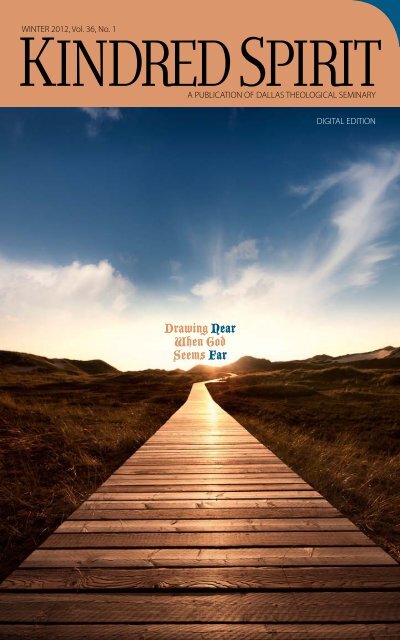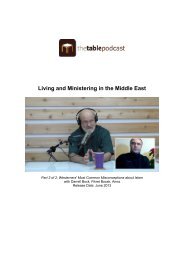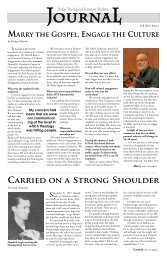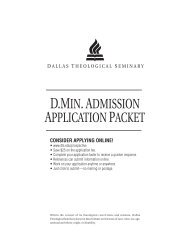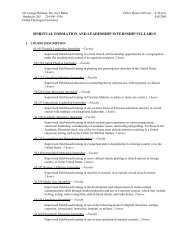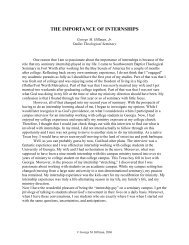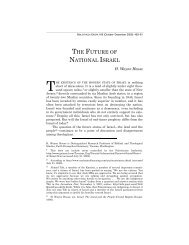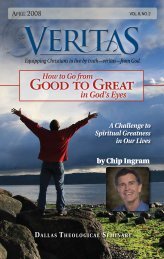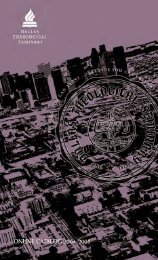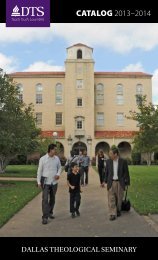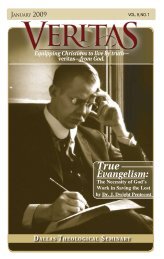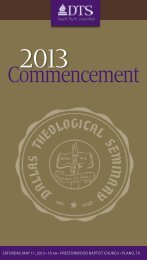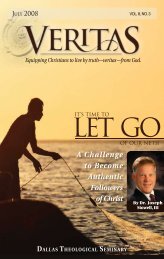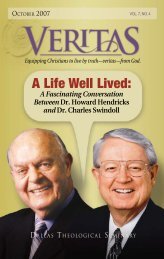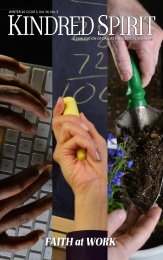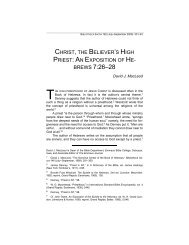Download - Dallas Theological Seminary
Download - Dallas Theological Seminary
Download - Dallas Theological Seminary
Create successful ePaper yourself
Turn your PDF publications into a flip-book with our unique Google optimized e-Paper software.
WINTER 2012, Vol. 36, No. 1<br />
KINDRED SPIRIT<br />
A PUBLICATION OF DALLAS THEOLOGICAL SEMINARY<br />
DIGITAL EDITION<br />
Drawing Near<br />
When God<br />
Seems Far
<strong>Dallas</strong> <strong>Theological</strong> <strong>Seminary</strong>’s mission<br />
is to glorify God by equipping godly servantleaders<br />
for the proclamation of His Word and the<br />
building up of the body of Christ worldwide.<br />
KINDRED SPIRIT ®<br />
Winter 2012<br />
Vol. 36, No. 1<br />
ISSN 1092–7492<br />
© 2012. All rights reserved.<br />
Published three times a year<br />
by <strong>Dallas</strong> <strong>Theological</strong> <strong>Seminary</strong><br />
3909 Swiss Avenue, <strong>Dallas</strong>, Texas 75204<br />
Dr. Mark L. Bailey, President<br />
Dr. Mark M. Yarbrough, Vice President<br />
for Communications<br />
Sandra L. Glahn, Editor-in-Chief<br />
Keith D. Yates, Director of Creative Services<br />
and Publications<br />
Dr. Roy B. Zuck, Copy and <strong>Theological</strong> Editor<br />
Debbie J. Stevenson, Production Manager<br />
Kelli Sallman, Copy Editing Service<br />
Illustration p. 19, from Bunyan’s Pilgrim’s<br />
Progress, designed by Frederick Barnard and<br />
others, engraved by Dalziel Brothers, 1894.<br />
Back cover art, Linda Tomczak<br />
SUBSCRIBE<br />
Subscriptions are free of charge<br />
to addresses in the United States.<br />
Call 800-DTS-WORD or 214-824-3094 and<br />
ask for the Kindred Spirit subscription office,<br />
sign up online at www.dts.edu/ks, or write<br />
to the address below.<br />
EMAIL<br />
For information about DTS’s graduate<br />
degree programs: fyi@dts.edu<br />
To correspond by email: ks@dts.edu<br />
To submit articles, request reprints, or make<br />
comments: sglahn@dts.edu<br />
DONATIONS<br />
For information on how you can<br />
support the ministry of DTS call<br />
214-841-3720.<br />
KS ONLINE/SUBMISSIONS<br />
To download writers’ guidelines or to view<br />
Kindred Spirit online visit www.dts.edu/ks.<br />
POSTMASTER<br />
Email address changes to<br />
rkilgore@dts.edu, or send to:<br />
DTS‐Kindred Spirit<br />
3909 Swiss Avenue<br />
<strong>Dallas</strong>, Texas 75204<br />
Unless noted otherwise, Scripture<br />
quotations are taken from the Holy Bible,<br />
New International Version, © 1973, 1978,<br />
1984 by International Bible Society.<br />
Used by permission of Zondervan<br />
Publishing House.<br />
FROM THE PRESIDENT<br />
Hope through the Night<br />
Dr. Mark L. Bailey<br />
To listen to some radio and television speakers, you<br />
would think that suffering, pain, and even despair are<br />
foreign, or at least should be foreign, experiences to the<br />
life of the Christian. But throughout the Scriptures as well<br />
as the history of the church, men and women of faith have<br />
experienced their “dark night of the soul,” a phrase made popular by<br />
the sixteenth-century poet, John of the Cross.<br />
For some, such a period accompanies a struggle against sin (see<br />
Psalm 22) or follows physical exhaustion. For others, it follows<br />
intense prayer answered by God with a “no.” But for many, as with<br />
Elijah, it actually follows a time of spiritual success (see 1 Kings 19).<br />
Perhaps you or someone you love are crying, “Save me!” and<br />
“Help my unbelief!” Or maybe like David you’re asking, “Why have<br />
you forsaken me?” (Ps. 22:1). As I’ve talked with hundreds, if not<br />
thousands, of ministry leaders, I’ve heard the desolation and despair<br />
uttered during times of such deep darkness. Sometimes the best we<br />
can do is listen and state by our very presence, “You are not alone.”<br />
In this issue of Kindred Spirit, we explore the theme of drawing<br />
near when God seems far. Retired DTS professor Dr. Roy Zuck walks<br />
us through David’s cry of seeming abandonment echoed by Jesus on<br />
the cross. Lesa Engelthaler reflects on her own experience through<br />
a “dark night” to provide suggestions for helping those who feel<br />
deserted by God. And DTS grad Mark McGinniss speaks from a place<br />
of enduring one of the most physically painful conditions known to<br />
humanity to declare that even there, God is present.<br />
With this issue we also feature a profile of one of our grads,<br />
Malachy Williams, who seeks to use her gifts at a New York City<br />
television station to reach those still walking in complete darkness<br />
without Christ.<br />
With the new year comes the launch of an expanded online<br />
section of resources on the Kindred Spirit website. Now you can<br />
access more articles, excerpts, and video links on our featured topic,<br />
as well as many other subjects at www.dts.edu/ks.<br />
In his book on Malachi, Restless Faith, DTS alumnus Winn<br />
Collier tells of a long, dry spell in his own life in which God seemed<br />
absent. “Uncomfortable as the silence, especially God’s silence, is,”<br />
he concludes, “it is mandatory for the Christian pilgrimage. Jesus<br />
required the wilderness and the garden—periods of grave silence,<br />
deep sorrow, and utter aloneness—to clearly hear the Father.”<br />
Yet even in such a difficult place, we can remember the words of<br />
Moses echoed by the writer of Hebrews, “The LORD your God goes<br />
with you; he will never leave you nor forsake you” (Deut. 31:6;<br />
Hebr. 13:5).<br />
4 I<br />
6 I<br />
8 I<br />
10 I<br />
When God Is Silent<br />
A look at Psalm 22 from David’s perspective provides a<br />
guide for talking to God when He doesn’t seem to<br />
answer back.<br />
Surviving the Silence: How to Help<br />
Having been through her own “dark night,” Lesa<br />
Engelthaler provides a guide for helping those who<br />
feel as if God has abandoned them.<br />
When All Else Fails<br />
A DTS grad suffers with one of the most painful conditions<br />
known to humanity. And God is there.<br />
Someone Called:<br />
Profile of Malachy Williams<br />
In New York City’s tri-state area, DTS graduate Malachy<br />
Williams answers God’s call to serve Him in the TV station,<br />
the seminary classroom, and in the church.<br />
Kindred Spirit Online Content you won’t find in these printed pages<br />
Featured Article<br />
When the Bottom<br />
Drops Out<br />
WINTER 2012, Vol. 36, No. 1<br />
CONTENTS<br />
“Do not be far from me, for trouble is near<br />
and there is no one to help” (Psalm 22:11).<br />
Also, book excerpts and links<br />
to other articles by DTS alumni.<br />
See a detailed listing on p. 13.<br />
2 <strong>Dallas</strong> <strong>Theological</strong> <strong>Seminary</strong> Kindred Spirit, Winter 2012 3
When God Is Silent<br />
Roy B. Zuck<br />
A LITTLE BOY PRAYED, “Lord, please make Boulder the capital of Colorado.”<br />
His friend asked, “Why did you pray that?”<br />
“Because that’s the answer I put on my exam.”<br />
Obviously God might not answer that prayer. But what about legitimate prayers? Sometimes we make<br />
requests we think are in line with what God wants, but He seems silent. He seems to ignore us. We feel He<br />
has gone off and left us. He is distant, far off, unconcerned, and has abandoned us—or so it seems.<br />
David prayed, “My God, my God, why have you forsaken me? Why are you so far from saving<br />
me? ... O my God, I cry out by day, but you do not answer me” (Ps. 22:1–2). Many Christians feel that way<br />
today. “Why doesn’t he heal me?” “Why doesn’t God bring back my wayward son?” “Why did God take my<br />
spouse to heaven?”<br />
When we feel like that, Psalm 22 offers us a guide through the dark.<br />
Since some of the verses in this psalm seem like they are referring to Christ, some say all of it is<br />
prophetic of Christ. Yet it seems better to see the psalm as referring first to David’s experiences, with<br />
many of the statements then being applied to Christ. In other words, the psalm is recording primarily the<br />
experience of David, who was suffering at the hands of wicked men. The psalm shows us a progression of<br />
response to physical and emotional pain. These are steps David took, and they are also steps Jesus took.<br />
Tell God your problem (vv. 1–2, 6–8, 11–18). Twice in the first verse David asked “Why?” Yet three times<br />
in the first two verses he said “My God.” Even though he wondered why God seemed absent, he voiced<br />
his problem to the Lord. On the cross Jesus voiced these same words. He felt forsaken by God the<br />
Father because He was bearing the sins of the world. As Peter wrote, Jesus “bore our sins in<br />
his body on the tree” (1 Pet. 2:24). And Isaiah wrote, “He was crushed for our iniquities”<br />
and “the Lord has laid on Him the iniquity of us all” (Isa. 53:5–6).<br />
David said that God did not seem to hear his groaning (v. 1), and he said<br />
that God did not answer him either in the daytime or at night (v. 2).<br />
David also wrote that he felt like a worm—that is, insignificant and<br />
unwanted. People despised him, mocked him, and shook their<br />
heads at him. In David’s first petition in the psalm (v. 11) he<br />
asked that God not be far from him, because trouble<br />
was near. Then in figurative language he said<br />
that enemies surrounded him like bulls and<br />
scavenger dogs (vv. 12, 16), and they tore<br />
at him like lions (v. 13). His heart<br />
melted (v. 14), his bones were out<br />
of joint (v. 14), his strength<br />
was gone (v. 15), his<br />
body was pierced<br />
(v. 16), and he<br />
was so emaciated that his bones were exposed (v. 17). He was brutally honest in telling God that it didn’t seem<br />
as if He was hearing him.<br />
Yet, though he felt abandoned by God, David did not denounce Him. We too should tell God our problem,<br />
even telling Him that He seems remote and aloof.<br />
Remember His faithfulness (vv. 3–5, 9–10). Though God seemed distant, David knew God is holy and can<br />
be trusted. Though God was silent, He is still sovereign. In verses 3–5, David used the word “you” six times in<br />
referring to God. This shows that in his agony David focused on God and His holiness. Though puzzled, he still<br />
praised Him. David mentioned that his own “fathers” (ancestors) put their trust in Him, and so he wanted God<br />
to help him too. “You didn’t forsake them, so why forsake me?”<br />
Then David reminded the Lord that He had nurtured him right from the moment of his birth; so why<br />
should He abandon him now? “Lord, You were faithful in the past, so be faithful now” (vv. 9–10).<br />
Keep praying (vv. 19–21). David went on to voice several requests to God. He asked God to be not far off<br />
from him, to help him, to deliver him, to rescue him, and to save him. In referring to dogs, lions, and oxen, he<br />
reversed the order of these three animals from the order in which he mentioned them in verses 12–13 and 16.<br />
Praise Him (vv. 22–31). Determined to praise the Lord (v. 22), David called on Israel to praise, fear, and<br />
revere Him (v. 23). David was sure that God does see those who are suffering and He hears their cry for help<br />
(v. 24). He said he would worship the Lord (v. 25), and then he called on the poor and the rich to praise Him<br />
(vv. 26–29), including all the families of the earth (v. 27). Even people not yet born would praise him<br />
(vv. 30–31).<br />
In a storm at sea, apparent disaster was ahead. The son of author Robert Louis Stevenson<br />
was on board. So he went to the captain’s cabin and asked if something could be done<br />
about the bad situation. Just then the pilot turned and smiled. Stevenson’s son went<br />
back to the men and said, “I have good news.”<br />
“What do you mean?” they asked.<br />
He said, “I’ve just seen the pilot’s face, and that’s enough.”<br />
We have seen the pilot’s face, and it tells us enough to<br />
know all will be well.<br />
Dr. Roy B. Zuck (ThM, 1957; ThD, 1961) is senior professor emeritus<br />
of Bible Exposition, DTS, and editor of Bibliotheca Sacra.<br />
4 <strong>Dallas</strong> <strong>Theological</strong> <strong>Seminary</strong><br />
Kindred Spirit, Winter 2012 5
Surviving the Silence<br />
How to Help<br />
Lesa Engelthaler<br />
GOD WAS SILENT. I could not feel His presence. And this was different—this time I had been<br />
walking with Him, yet it seemed like He moved. Do you know someone with a similar experience?<br />
For those with friends suffering such a “dark night,” I have some suggestions.<br />
n Avoid platitudes. The standard reply I received<br />
was, “Just remember that Moses had to wander for<br />
forty years in the desert.” Or “If it feels like God is far<br />
away, guess who moved?” More helpful replies were,<br />
“That stinks,” and “I am here right now.” Better yet<br />
was loving, silent presence.<br />
n Explore alternative ways to “do church.” Where<br />
two or more gather in His name, Christ is present.<br />
During that dark time, meeting with small groups<br />
ministered to me far more than church services<br />
where I felt like a spectator.<br />
n Encourage different practices from the usual. For<br />
me that meant exploring silence, solitude, kneeling<br />
by the bed to pray, and going on a silent retreat.<br />
n Recommend a spiritual director. I needed someone<br />
who understood spiritual formation, not merely<br />
a therapist. A spiritual director listened without<br />
judgment to my raging, and prayed over me.<br />
n Embrace lamentations together. When the<br />
apostle Paul seemed too black-and-white, and<br />
genocide in the Old Testament too harsh, David’s<br />
psalms still reached me—like “My God, why have<br />
you forsaken me?” I identified with Jeremiah in the<br />
book of Lamentations: “He has made me to dwell in<br />
darkness.... Even when I call out or cry for help,<br />
he shuts out my prayers” (Lam. 3:6,8). But Jeremiah<br />
also says, “Yet this I call to mind and therefore I have<br />
hope: Because of the LORD’s great love we are not<br />
consumed, for his compassions never fail” (vv. 21–23).<br />
n Recommend new authors. Eugene Peterson’s<br />
classic, A Long Obedience in the Same Direction,<br />
was a welcome companion. And prayer from the<br />
Book of Common Prayer reminded me that others<br />
had walked the same pathway. Most helpful was the<br />
honesty of old saints: John of the Cross, Ignatius, and<br />
Thomas Merton. Not many seasoned evangelicals<br />
have written on this issue, but the time-tested<br />
Christian classic works have endured for a reason.<br />
Eugene Peterson’s words bring a needed reminder<br />
that God will hold onto us: “All the persons of faith I<br />
know are sinners, doubters, uneven performers. We<br />
are secure not because we are sure of ourselves, but<br />
because we trust that God is sure of us. Neither our<br />
feelings of depression nor the facts of suffering nor<br />
the possibilities of defection are evidence that God<br />
has abandoned us.”<br />
For more on the journey of Lesa Engelthaler (Mark, ThM, 1984;<br />
DMin, 1994), see her related article in the October 2011 issue of<br />
Leadership Journal, available at LeadershipJournal.net.<br />
6 <strong>Dallas</strong> <strong>Theological</strong> <strong>Seminary</strong><br />
Kindred Spirit, Winter 2012 7
Mark McGinniss<br />
When All Else Fails<br />
EVEN THROUGH THE HAZE OF ANESTHESIA,<br />
I knew my brain surgery had failed.<br />
In October of 2010, I was diagnosed with<br />
trigeminal neuralgia (TN), a nerve disorder<br />
characterized by episodes of searing pain that affects<br />
either side of the face. In my case TN affects the<br />
left side. Besides cluster headaches, TN is the most<br />
painful condition known to the medical profession.<br />
I’m told that even childbirth and kidney stones<br />
cause less agony. TN is so excruciating that it has<br />
been called the “suicide disease.” Only a handful of<br />
procedures manage the condition, albeit temporarily,<br />
and only one offers a cure.<br />
My wife, Joy, and I chose the cure: a<br />
microvascular decompression (MVD). It is a type<br />
of invasive brain surgery. It is the only procedure<br />
that offers the chance of a permanent fix, with a<br />
95-percent success rate. My MVD was scheduled<br />
for April. A world-renowned neurosurgeon led<br />
my operating team, and I was treated at a premier<br />
hospital. A company of people from coast to<br />
coast prayed fervently for success. I had the<br />
best possible prognosis. All the odds favored<br />
success.<br />
But afterward as I lay in ICU among<br />
the numerous IV’s and beeps of various<br />
monitors, I realized I was in the 5 percent.<br />
My surgeon suggested a glycerol rhizotomy<br />
as an alternative to deal with my TN. A rhizotomy<br />
is less invasive, but it provides only temporary<br />
relief. The best it could afford (if successful) was a<br />
one- to seven-year respite from pain. Though not<br />
a permanent fix, it could be repeated as needed.<br />
Statistically this medical procedure offered a<br />
90-percent success rate.<br />
Two months later, I underwent a second<br />
surgical procedure. And in the recovery room my<br />
neurosurgeon met Joy and me. He explained that<br />
everything had gone as planned. He was very<br />
pleased, and from his perspective the chance of<br />
success was high.<br />
But from my perspective, the left side of my face<br />
resembled the cheeks of an overstuffed chipmunk. I<br />
felt as if a dentist had over-administered Novocain.<br />
And even through the facial numbness of the<br />
rhizotomy, the pain came roaring back.<br />
With tears we realized that we were in the 10<br />
percent.<br />
Another medical failure. Hopes crushed.<br />
A certain future with tremendous pain.<br />
When surgery fails, when the prognosis<br />
cannot be any worse, when intense pain is the only<br />
certainty, how do you face the rest of life? How do<br />
you get out of bed day after day when the only thing<br />
you are certain of feeling is pain or the dread of more<br />
pain?<br />
And these are only the questions that trouble the<br />
body. What about the emotions of the soul, the deep<br />
disappointment that threatens to turn to despair, the<br />
plague of loneliness, the anxiety and fear that the life<br />
once enjoyed is over forever?<br />
As I wrestle with these questions and<br />
contemplate a life with pain as a constant<br />
companion, I am reminded of certain truths that<br />
For those who must live with failure,<br />
the guarantee of a new order is a sure<br />
promise of new life without pain or tears.<br />
orient my view of failure. Unfortunately, these<br />
thoughts do not eliminate physical pain, but they<br />
may encourage the soul.<br />
Failure Does Not Mean That God Does Not Love You<br />
It is easy to imagine in the midst of failure that<br />
somehow God has ceased to love. We reason that<br />
if God truly loved us, He would grant success. We<br />
assume we must read failure as God’s lack of love.<br />
Failure, therefore, separates us from God’s love.<br />
While we may feel this way, the truth is much<br />
different. The apostle Paul anticipates such emotions<br />
in the midst of difficulties, and he asks a rhetorical<br />
question of the Christians in Rome: “Who shall<br />
separate us from the love of Christ? Shall trouble<br />
or hardship or persecution or famine or nakedness<br />
or danger or sword?” (Rom 8:35). Paul’s question is<br />
meant to elicit an emphatic “No” from his readers.<br />
Paul was convinced that nothing—even a surgical<br />
failure—could separate a believer from the love of<br />
God (Rom 8:38–39).<br />
continued on page 17<br />
8 <strong>Dallas</strong> <strong>Theological</strong> <strong>Seminary</strong><br />
Kindred Spirit, Winter 2012 9
Someone<br />
Jill Noel Shreve<br />
Called<br />
Profile of Malachy Williams<br />
Malachy Marie<br />
Williams (ThM, 2004)<br />
sat on a mountaintop<br />
overlooking the hazy<br />
Manhattan skyline.<br />
She had just graduated from DTS and moved<br />
back to the Northeast. She spoke to God about her<br />
work, her life, and her future. She desired to serve<br />
where He wanted, so she sought His direction. And<br />
the first of many calls came on that mountaintop—<br />
literally. Her phone rang.<br />
Malachy’s sister was on the other end, and she<br />
asked Malachy to contact FOX5/My9. The television<br />
station had an open position, and Malachy’s former<br />
boss wanted to speak with her about it.<br />
Malachy soon rejoined New York City’s duopoly<br />
FOX5/My9 full-time as sales promotions and<br />
marketing producer. She had worked at the station<br />
prior to her time at DTS, and the Lord opened the door<br />
again on her return. “Every day I walk into something<br />
different,” Malachy said.<br />
Since rejoining, Malachy has come to manage<br />
many projects year-round, but the one requiring most<br />
of her time is the annual McDonald’s Gospelfest. This<br />
one-day event—full of Christian artists, speakers,<br />
and preachers—takes place in the Prudential Center,<br />
in the heart of Newark. The TV station supports<br />
the event both by promoting it throughout the year<br />
and by recording it, using a full production crew<br />
and multi-camera shoot. The station then edits the<br />
footage and broadcasts it. Malachy contributes to this<br />
process as the show’s lead broadcast producer.<br />
Following her graduation from DTS and a term on the adjunct faculty at<br />
Hunter College in New York City, Jill Noel Shreve (MA/CE, MA/MC, 2009)<br />
teaches American Literature and Composition at a private, college-prep<br />
school in south <strong>Dallas</strong>. You can read more about her at jillnoelshreve.com.<br />
On post-event day, Malachy receives an eighthour<br />
director’s cut, which she and her editor sweat<br />
down to a forty-six-minute television show. This<br />
airs as a one-hour special across a three-state area,<br />
transmitting the gospel to New York City’s eight<br />
million citizens and far beyond. “When I’m in the edit<br />
room,” Malachy said, “I’m trying to bring integrity to<br />
the project as much as possible so it’s clear this is not<br />
just a commercial event. We do our best to make sure<br />
the gospel is clearly projected.”<br />
As Malachy has diligently worked, people have<br />
taken notice—including McDonald’s. The nationwide<br />
food chain holds an annual commencement<br />
celebration for Black History Month. They recognize<br />
“Black Media Legends” in the tri-state area who’ve<br />
done outstanding work. And last year, alongside<br />
seventeen other such legends, Malachy was honored<br />
for her efforts.<br />
“Of course I’m not a legend,” Malachy said. “I<br />
don’t know how I got in that lineup. We normally<br />
have people in front of the camera receiving these<br />
awards. It was a real surprise.” The award came with<br />
the honorees’ photos on tri-state area McDonald’s<br />
posters and tray liners for the entire month of<br />
February.<br />
On Malachy’s return to New York, God did more<br />
than open the TV station door for her. Along with<br />
giving her the job at the TV station, God also called<br />
her to academia. “My friend was teaching in the<br />
certificate program at New York <strong>Seminary</strong>,” Malachy<br />
explained. “But she had to go on medical leave. She<br />
required a replacement and asked me.” Since then,<br />
Malachy has taught introductory theology, Christian<br />
education, and church history as an adjunct<br />
professor at the school. She dedicates her time in<br />
the classroom to steering students toward “loving<br />
God and loving truth.” She knows learning truth<br />
is a process, and she encourages her students to<br />
“stay close to God” in that process. She wants<br />
them to leave her classroom knowing more<br />
intimately that “it’s Jesus Christ who rules and<br />
reigns, and He’s the Lord of all.”<br />
Since returning to the station and teaching<br />
at the seminary, yet another door has opened.<br />
Malachy has answered the call to serve as the<br />
associate minister of worship and the arts at<br />
her home church. She saw a need, offered to<br />
help, and committed to serving in worship and<br />
the arts at First Baptist Church in Elizabeth,<br />
New Jersey. She believes people are made to<br />
worship God, and she has set out to facilitate<br />
that connection. Her senior pastor, Reverend<br />
Brown, said, “Malachy has such a love for God’s<br />
people.” He commends her faithfulness to them<br />
and commitment to the importance of worship.<br />
Each week, Malachy finds Scripture and<br />
hymns that assist people in authentically<br />
worshiping the Lord and seeing His<br />
truth. “Malachy helps members<br />
to be free,” Reverend Brown<br />
said. “Free to take on the<br />
posture that God has<br />
placed in their hearts<br />
to worship. She<br />
desires for people to<br />
worship in truth.”<br />
Malachy said,<br />
“God’s the one we<br />
have to pursue, and<br />
it’s His truth we have<br />
to uphold.” As she<br />
has pursued Him, He<br />
has continued to call<br />
her—at the station, in<br />
the classroom, and in the<br />
church. And millions have<br />
benefited from her answer.<br />
Photos by Frank Ortiz<br />
10 <strong>Dallas</strong> <strong>Theological</strong> <strong>Seminary</strong><br />
Kindred Spirit, Winter 2012 11
CAMPUS NEWS<br />
AN UNPARALLELED RESOURCE<br />
Subscribe to DTS’s highly acclaimed theological<br />
journal Bibliotheca Sacra, and you’ll<br />
have a ready resource on biblical and<br />
doctrinal topics. A paid subscription<br />
to the print edition gives you online<br />
access to every issue the <strong>Seminary</strong> has<br />
published since 1934.<br />
You can get a one-year subscription (four issues)<br />
for just $29; two-year (eight issues) for $49; and fiveyear<br />
(20 issues) for $104.<br />
Go to dts.edu/bibsac or call 214-841-3729.<br />
Bib Sac occassionally offers a free article<br />
download such as “Have the Prophecies in Revelation<br />
17–18 about Babylon Been Fulfilled?”<br />
To access this article scan this<br />
code with your smart phone or go<br />
to dts.edu/about/news/20090114-<br />
free-bibsac-article.<br />
MASTER<br />
OF ARTS IN<br />
CHRISTIAN<br />
LEADERSHIP<br />
(MA/CL)<br />
If you already work at<br />
a church or ministry,<br />
you can earn up to<br />
twelve hours of credit<br />
toward a Master of Arts<br />
in Christian Leadership<br />
(MA/CL) degree from<br />
<strong>Dallas</strong> <strong>Theological</strong><br />
<strong>Seminary</strong> by doing<br />
what you already love<br />
to do. Minister within<br />
NEW DEGREE<br />
PROGRAM<br />
your own community of faith and reflect on that<br />
experience. Both MA/CL students and Master of<br />
Theology (ThM) students now have the option of<br />
completing either a three-credit-hour Servant<br />
Leadership internship or a twelve-credit-hour<br />
Ministry residency. Find more information at<br />
www.dts.edu/macl.<br />
“CAN WE TRUST THE TEXT?” DVD AVAILABLE<br />
This past fall the Center for the Study of New Testament<br />
Manuscripts (CSNTM) sponsored a debate<br />
between Dr. Bart Ehrman and DTS’s own Dr. Daniel<br />
B. Wallace titled, “Can We Trust the Text of the New<br />
Testament?” The debate, which took place on the<br />
campus of Southern Methodist University in<br />
<strong>Dallas</strong>, was the largest-ever such event about the<br />
text of the New Testament. CSNTM is offering DVDs<br />
of the debate. For more information go to csntm.org.<br />
DTS Houston employees celebrated Dr. Dwight Pentecost’s donation<br />
of his library to their campus.<br />
COMING UP<br />
LEADERSHIP EVENT<br />
The Gathering at DTS: A Collaborative Learning<br />
Environment<br />
Monday, February 13, 2012, 9 AM–3:30 PM<br />
Join us on the <strong>Dallas</strong> campus for a one-day leadership<br />
event. Designed for church and ministry staff<br />
members, The Gathering will give you a chance to<br />
dialogue about, generate, and apply successful ideas<br />
for church ministry in a collaborative atmosphere<br />
with other ministry leaders.<br />
2012 WIVES OF MEN IN MINISTRY RETREAT<br />
Sunday, April 15–Tuesday, April 17, 2012<br />
Pine Cove Camp and Conference Center, Tyler, Texas<br />
Visit dts.edu/ccl for more information and to register.<br />
Questions? Call the events team at 214-841-3699.<br />
Hosted by the Howard G. Hendricks Center for<br />
Christian Leadership.<br />
TAKE AN EDUVACATION WITH DTS<br />
Reformation Tour: May 20–31, 2012<br />
Journey with DTS on a tour of spiritually rich<br />
Reformation sights in quaint villages and towns of<br />
Germany and Switzerland. There will be plenty of<br />
time to shop, dine, and relax in exquisite accommodations.<br />
The tour will be led by president Dr. Mark<br />
Bailey and Dr. John Hannah, distinguished professor<br />
of Historical Theology and research professor of<br />
<strong>Theological</strong> Studies. Dr. Hannah has led Reformation<br />
tours through Europe for more than twenty years. For<br />
more information visit dts.edu/travel.<br />
Recommended Books<br />
from DTS Faculty<br />
Last spring the <strong>Dallas</strong> <strong>Seminary</strong> Book Center polled<br />
members of the faculty for what books they considered<br />
essential to our graduates entering ministry.<br />
Here’s what some of them said:<br />
• Reg Grant: Think, by John Piper<br />
• Brian Webster: Divorce and Remarriage in the<br />
Church, by David Instone-Brewer<br />
• Gary Barnes: A Lasting Promise, by Scott Stanley<br />
• Lanier Burns: An excellent study Bible: NIV Study<br />
Bible or Life Application Bible<br />
• Jim Thames: Feeding and Leading, by Kenneth<br />
Gangel<br />
• Ron Blue: Grace Awakening, by Charles Swindoll<br />
• Darrell Bock: Designed to Be Like Him, by<br />
J. Dwight Pentecost<br />
• Glenn Kreider: A good theological encyclopedia/<br />
dictionary<br />
• Steve Strauss: The Mission of God, by Chris Wright<br />
and Operation World, by Jason Mandryk<br />
• Joye Baker and John Hannah: My Utmost for His<br />
Highest, by J. Oswald Chambers<br />
• Ramesh Richard: Blank composition books<br />
• Joseph Fantin: Dictionary of New Testament Backgrounds,<br />
by Porter/Evans; Backgrounds of the<br />
New Testament, by Everett Ferguson; Honor,<br />
Patronship, Kinship and Purity, by David<br />
deSilva<br />
• Larry Waters: When God Weeps, by Joni Eareckson-Tada;<br />
Why, O God? by Larry Waters et al.;<br />
and The Messianic Hope, by Michael Rydelink<br />
• Dorian Coover-Cox: The Journey from Texts to<br />
Translation, by Paul Wegner<br />
• Michael Lawson: In the Name of Jesus, by Henri<br />
Nouwen<br />
• John Hilber: Ancient Near Eastern Thought and the<br />
Old Testament, by John Walton<br />
• Jay Sedwick: Sustainable Youth Ministry, by Mark<br />
DeVries<br />
• Sandra Glahn: Disciples Are Made, Not Born, by<br />
Walt Henrichsen<br />
• Bill Bryan: Morning and Evening, by Charles<br />
Spurgeon<br />
• George Hillman: Leadership Challenge, by Kouzes/<br />
Posner<br />
• Tom Constable: The Bible<br />
• Mike Svigel: The ESV Study Bible, and Early Christian<br />
Doctrines, by J. N. D. Kelly<br />
Read It<br />
Now at<br />
dts.edu/ks<br />
n BOOK EXCERPTS<br />
When the Bottom Drops Out, “Truths in the Night,”<br />
Dr. Robert Bugh (ThM, 1990)<br />
Cruciform: Living the Cross-Shaped Life, “Created<br />
to Be Cruciform,”<br />
Jimmy Davis (MA/CE, 1996; MA[BS], 1997)<br />
I Never Thought I’d See the Day, “When Atheists<br />
Would Be Angry,”<br />
Dr. David Jeremiah (ThM, 1967)<br />
From the Garden to the City, “Reflections,”<br />
John Dyer (ThM, 2008)<br />
Solid Stepping Stones for the Christian Journey,<br />
“Tying up a Loose End,”<br />
Dr. Robert P. Lightner (ThM, 1959; ThD, 1964)<br />
The Christian Zombie Killers Handbook, “Zombie<br />
Rules,”<br />
Jeff Kinley (ThM, 1986)<br />
Insights in Revelation, “Messages of the Majestic<br />
Savior,”<br />
Dr. Charles Swindoll, Chancellor<br />
n LINKS<br />
News profile of DTS student and TV weather<br />
forecaster, Grant Johnson<br />
“Harold Camping Stole My Parents,”<br />
article by Sharifa Stevens (ThM, 2004)<br />
“Heaping Helping of Horse Pucky Monday,”<br />
A critical film review of The Help by Stephanie<br />
Morris-Graves (MA[BS] 2006)<br />
“When God Doesn’t Heal,” article by Dr. Mark<br />
Yarbrough (ThM, 1996; PhD, 2008)<br />
The <strong>Dallas</strong> Morning News article highlighting<br />
longtime DTS professor Dr. Gene Getz, whose<br />
new study Bible includes QR codes that take<br />
readers with smartphones to video mes sages<br />
A video for our readers only: Jennie Allen’s<br />
(MA[BS], 2005) entire first session of Stuck: The<br />
Places We Get Stuck and the God Who Frees Us<br />
n ARTICLE<br />
KS ONLINE<br />
“How to Talk to Your Relatives about Spiritual<br />
Things,” by Larry Moyer (ThM, 1973)<br />
12 <strong>Dallas</strong> <strong>Theological</strong> <strong>Seminary</strong><br />
Kindred Spirit, Winter 2012 13
NEW RESOURCES from the <strong>Seminary</strong> Family<br />
More resources at dts.edu/books.<br />
The Abrahamic Revolution: God’s Mission<br />
in Motion<br />
Dr. Todd Ahrend (MA[BS], 2004)<br />
Cruciform: Living the Cross-Shaped Life**<br />
Jimmy Davis (MA/CE, 1996, MA[BS], 1997)<br />
Forgiving As We’ve Been Forgiven<br />
Dr. L. Gregory Jones and Dr. Célestin<br />
Musekura (STM, 1998; PhD, 2007)<br />
Is Love Wrong? An Evangelical Christian<br />
Encounters a Gay Activist<br />
Chris Plekenpol (ThM, 2010)<br />
The Path to the Cross<br />
Barry Applewhite (ThM, 1976)<br />
Muir House: A Novel<br />
150 Quick Questions to Get Your Kids<br />
Talking<br />
You Can Raise Courageous and Confident<br />
Kids<br />
Mary DeMuth (Patrick, ThM, 2002)<br />
Solid Stepping Stones for the Christian<br />
Journey<br />
Dr. Robert Lightner (ThM, 1959; ThD,<br />
1964)* **<br />
The Camouflaged Church<br />
Dr. James B. Raiford Sr. (ThM, 1969; DMin,<br />
1990)<br />
Jesus the Messiah: Tracing the Promises,<br />
Expectations and Coming of Israel’s King<br />
Dr. Herbert Bateman IV (ThM, 1987; PhD,<br />
1993), Dr. Darrell Bock (ThM, 1979),* and Dr.<br />
Gordon Johnston (ThM, 1985; ThD, 1992)*<br />
The Lord of the Entire World: Lord Jesus, a<br />
Challenge to Lord Caesar?<br />
Dr. Joseph D. Fantin (ThM, 1995; PhD, 2003)*<br />
The Gift: A Novel<br />
Dr. Bryan Litfin (ThM, 1997)<br />
Stepping Up: A Call to Courageous Manhood<br />
Dr. Dennis Rainey (MA[BS], 1976)<br />
A Taste of the Classics. Vols. 2-4<br />
Dr. Kenneth Boa (ThM, 1972)<br />
How to Destroy Your Spiritual Life<br />
Ed Frank (ThM, 1997)<br />
Live Life on Purpose<br />
Claude Hickman (MA[BS], 2008)<br />
Cyber Meltdown<br />
1001 Unforgettable Quotes about God, Faith<br />
and the Bible<br />
Bite-Size Bible Answers<br />
Bite-Size Bible Definitions<br />
Dr. Ron Rhodes (ThM, 1983; ThD, 1986)<br />
The Gospel According to Isaiah 53<br />
Dr. Darrell Bock (ThM, 1979)* and Mitch<br />
Glaser, eds.<br />
Dying to Live<br />
Dr. Charles Haley (ThM, 1968)<br />
First Date: A Novel<br />
Krista McGee (David, ThM, 2003)<br />
52 Things Kids Need from a Mom<br />
Angela Thomas (MA/CE, 1987)<br />
When the Bottom Drops Out<br />
Dr. Robert Bugh (ThM, 1980)**<br />
Missional Spirituality: Embodying God’s<br />
Love from the Inside Out<br />
Roger Helland (ThM, 1983) and Len<br />
Hjalmarson<br />
Wednesday Crucifixion<br />
George Miller (ThM, 1959)<br />
The Story of Your Life<br />
Angela Thomas (MA/CE, 1987) and Matthew<br />
West<br />
Undefending Christianity: Embracing Truth<br />
without Having All the Answers<br />
Dillon Burroughs (ThM, 2002)<br />
Twilight’s Last Gleaming<br />
Dr. Robert Jeffress (ThM, 1981)<br />
Think Christianly: Looking at the Intersection<br />
of Faith and Culture<br />
Jonathan Morrow (Class of 2005)<br />
Prayer Journey Bible<br />
Dr. Elmer L. Towns (ThM, 1958)<br />
Not in My Town: Exposing and Ending<br />
Human Trafficking and Modern-Day<br />
Slavery<br />
Dillon Burroughs (ThM, 2002) and Charles<br />
Powell<br />
I Never Thought I’d See the Day! Culture at<br />
the Crossroads**<br />
Dr. David Jeremiah (ThM, 1967)<br />
*Denotes DTS faculty member<br />
**Excerpt online at www.dts.edu/ks<br />
Six Battles Every Man Must Win: And<br />
the Ancient Secrets You’ll Need to Succeed<br />
Bill Perkins (ThM, 1977)<br />
Beyond Boundaries: Learning to Trust Again<br />
in Relationships<br />
Dr. John Townsend (ThM, 1980)*<br />
14 <strong>Dallas</strong> <strong>Theological</strong> <strong>Seminary</strong> Kindred Spirit, Winter 2012 15
Revisiting the Corruption of the New<br />
Testament: Manuscript, Patristic, and<br />
Apocryphal Evidence<br />
Dr. Daniel B. Wallace (ThM, 1979; PhD,<br />
1995)*<br />
Messianic Prophecy (booklet)<br />
Dr. Steven Waterhouse (DMin, 1995)<br />
Corporal Punishment in the Bible<br />
Dr. William J. Webb (ThM, 1995; PhD, 1990)<br />
The Essential Bible Companion to the<br />
Psalms: Key Insights for Reading God’s<br />
Word (Essential Bible Companion Series)<br />
Dr. Brian Webster* and David R. Beach<br />
Come Talk with Me<br />
Buddy Westbrook (MA[BS], 1982)<br />
Business for the Common Good<br />
Dr. Kenman L. Wong and Dr. Scott Rae<br />
(ThM, 1981)<br />
DVD<br />
Stuck: The Places We Get Stuck and the<br />
God Who Frees Us<br />
Jennie Allen (MA[BS], 2005)<br />
TRACT<br />
Will Anyone Be in Hell?<br />
Dr. Roy B. Zuck (ThM, 1957; PhD, 1961)*<br />
BOOK NOTES AND QUOTES<br />
THE 925 WINDOW<br />
“If you have had much to do with the missionary movement<br />
over the past 20 years, you will probably recognize<br />
the term ‘10-40 Window,’” says Dale Losch (ThM, 1987),<br />
in his brochure, A Better Way: Make Disciples Wherever<br />
Life Happens. “It was coined by missionary strategist<br />
Luis Bush in 1990 to refer to those regions of the eastern<br />
hemisphere, located between 10-40 degrees north of the<br />
equator, having the highest concentration of least-reached<br />
people on the planet. While many are familiar with the<br />
10-40 Window, surprisingly few have heard of another<br />
unreached group of people living in the zone called the<br />
‘925 Window.’ The 925 Window is the window of opportunity<br />
most believers have from ‘9 to 5’ every day, being salt<br />
and light in an unbelieving world. It is a natural window of<br />
opportunity that allows us to enter the ordinary world of<br />
people that Jesus came to seek and to save.”<br />
The Resolution for Women, by Priscilla<br />
Shirer (MA[BS], 1998) has been named<br />
as a finalist in the USA “Best Books 2011”<br />
Awards from USA Book News, a premiere<br />
online magazine and review site for mainstream<br />
and independent publishing houses.<br />
The book is a New York Times bestseller.<br />
Publishers Weekly says, “The zombie invasion of the<br />
popular culture has become so pervasive that it makes<br />
[a History Channel] show [on the subject] a no-brainer—<br />
pun intended. In other zombie news, AMC’s<br />
second-season premier of ‘The Walking<br />
Dead’ opened to an eye-popping 7.3 million<br />
viewers … breaking cable ratings records<br />
among adults 18–49 and 25–54.” It is this<br />
culture to which Jeff Kinley (ThM, 1986)<br />
introduces The Christian Zombie Killers Handbook:<br />
Slaying the Living Dead Within (excerpt online).<br />
There are three conditions for “drawing near<br />
to God.” First, we must have a “true heart,”<br />
which means an honest attempt to relate to<br />
God. The word “draw near” is proseuchomai,<br />
which comes from pros, “toward,” and<br />
euchomai, “the face.” A true heart is honestly<br />
seeking God’s face. Second, we must come “in full<br />
assurance,” which means “we believe God exists” (Heb.<br />
11:6, ELT). Third, “having our hearts sprinkled from an evil<br />
conscience” (10:22).<br />
—Dr. Elmer Towns in Prayer Journey Bible<br />
When All Else Fails continued from page 9<br />
Failure Does Not Mean That All Hope Is Lost<br />
Bodily failure may lead to despair, and despair<br />
breeds hopelessness. Yet in the face of a physical and<br />
emotional collapse, Asaph declared, “My flesh and<br />
my heart may fail, but God is the strength of my heart<br />
and my portion forever” (Ps. 73:26).<br />
Whether we’re enduring emotional or physical<br />
pain or both, life is not contingent on the strength of<br />
the physical body or the emotional self. While “my<br />
flesh may fail” with continual pain, and hope for<br />
relief may be but a distant dream, there is another<br />
present reality: “But God….” In the midst of physical<br />
anguish there is always God, whose presence is our<br />
strength, even when the body betrays us.<br />
Failure Reminds Us to Look Beyond This Life<br />
With the advances in medical science, we sometimes<br />
believe the newest surgical technique or the justreleased<br />
prescription drug will prove successful.<br />
Our hope is pinned on statistics that suggest success<br />
favors our condition. Yet when we sit on the wrong<br />
side of the medical data, we are forced to look<br />
elsewhere for hope and relief.<br />
The new heavens and the new earth are not<br />
topics that one hears preached about much on any<br />
given Sunday. But for those who must live with<br />
failure, the guarantee of a new order is a sure promise<br />
of a new life, a life without pain or tears. In his vision<br />
from God, John writes, “He will wipe every tear from<br />
their eyes. There will be no more death or mourning<br />
or crying or pain” (Rev. 21:4). While this may sound<br />
like pie in the sky or even morbid, it was meant to<br />
give comfort to hurting saints and to demonstrate<br />
that pain, suffering, and even death are confined to<br />
this world and not the next.<br />
Even when medical options are exhausted<br />
and days clouded by painful tears, with this divine<br />
assurance those who live with failure look forward to<br />
the time when the Savior Himself will banish tears,<br />
pain, and death itself. In the new heavens and the<br />
new earth no one will experience failed surgeries.<br />
Failure Reminds Us That the Outer Person Is<br />
Decaying But…<br />
TN has taught me a significant theological truth<br />
about myself: I am a frail creature. Intellectually we<br />
know humanity is frail, but somehow individually<br />
we believe ourselves immune from experiencing the<br />
flesh’s weakness and decay. But the reality is we are<br />
dust (Gen. 3:14), and grass (Isa. 40:6–8), and our days<br />
are like grass (Ps. 103:15).<br />
Yet in our frailty there is another significant<br />
theological truth: “Therefore we do not lose heart.<br />
Continue with double earnestness to serve your<br />
Lord when no visible result is before you. Any<br />
simpleton can follow the narrow path in the light:<br />
faith’s rare wisdom enables us to march on in<br />
the dark with infallible accuracy, since she places<br />
her hand in that of her great Guide. Between this<br />
and heaven there may be rougher weather yet,<br />
but it is all provided for by our covenant Head.<br />
In nothing let us be turned aside from the path<br />
which the divine call has urged us to pursue.<br />
—Charles Haddon Spurgeon, from Letters to My Students<br />
Though outwardly we are wasting away, yet<br />
inwardly we are being renewed day by day” (2 Cor.<br />
4:16). While our physical body may experience<br />
failure, our spirit is renewed daily. And our renewed<br />
spirit affords us the grace to live with a frail body that<br />
is subject to pain.<br />
Disappointment, discouragement, and pain<br />
accompany the person living with a broken body.<br />
There may be an apprehension that the pain may<br />
even get worse. But in the midst of brokenness,<br />
we can believe there is a God who loves us, who is<br />
present with us in our suffering, who is our strength<br />
in physical weakness, and who has promised that a<br />
day is coming that includes no tears of failure.<br />
These are truths that will not fail, even when<br />
surgery does.<br />
Dr. Mark McGinniss (MA[BS], 1991) is associate professor of Old Testament at<br />
Baptist Bible College and <strong>Seminary</strong> in Clarks Summit, Pennsylvania.<br />
16 <strong>Dallas</strong> <strong>Theological</strong> <strong>Seminary</strong> Kindred Spirit, Winter 2012 17
Follow the FACULTY<br />
Taking the Word around the World<br />
For a complete listing of faculty travel go to www.dts.edu/ks.<br />
Members of <strong>Dallas</strong> <strong>Theological</strong> <strong>Seminary</strong>’s full-time faculty will<br />
minister at these locations in the months ahead.<br />
FROM THE CHANCELLOR<br />
The Pit, the Rust, and Help<br />
Dr. Charles R. Swindoll<br />
NORTHEAST<br />
Dr. Oscar Lopez<br />
Mar 2–4, 9–11 Hispanic<br />
Conferences, Keswick,<br />
Whitting, New Jersey<br />
MIDWEST<br />
Dr. Ronald Allen<br />
Feb 19 Hayward<br />
Wesleyan Church,<br />
Hayward, Wisconsin<br />
Dr. Mark Bailey<br />
Feb 9–10 Moody<br />
Founder’s Week, Moody<br />
Bible Institute, Chicago,<br />
Illinois; Feb 18–19 First<br />
Baptist Church, North<br />
Terre Haute, Indiana<br />
Dr. Charles Baylis<br />
Mar 25 Bible Conference,<br />
Metropolitan Baptist<br />
Church, Oklahoma City,<br />
Oklahoma<br />
Dr. Stephen Bramer<br />
Jan 28–29 Winter Bible<br />
Conference, Springfield<br />
Bible Church, Springfield,<br />
Illinois<br />
Dr. Stanley Toussaint<br />
Mar 10–14 Bible<br />
Conference,<br />
Marshalltown<br />
Evangelical Free Church,<br />
Marshalltown, Iowa<br />
SOUTHEAST<br />
Dr. Mark Bailey<br />
Feb 29 Bryan College<br />
Chapel, Dayton,<br />
Tennessee; Mar 18 Grace<br />
Church, Greenville, South<br />
Carolina<br />
Dr. Robert Lightner<br />
Apr 9–13 Piedmont<br />
Baptist Graduate School,<br />
Winston-Salem, North<br />
Carolina<br />
Dr. Stanley Toussaint<br />
Feb 12–17 Word of<br />
Life Bible Conference,<br />
Hudson, Florida<br />
Dr. Daniel B. Wallace<br />
Jan 27 New Testament<br />
Lectureship, Florida<br />
International University,<br />
Miami, Florida; Feb 1<br />
Reliability of the NT<br />
Debate with Dr. Bart<br />
Ehrman, University<br />
of North Carolina<br />
Chapel Hill, Chapel<br />
Hill, North Carolina;<br />
Feb 14 “The Bible’s<br />
Survival and Success:<br />
New Discoveries,<br />
Technologies and<br />
Challenges,” Passages<br />
Exhibit, Atlanta, Georgia;<br />
Feb 28–29 <strong>Theological</strong><br />
Forum, Mid-America<br />
Baptist <strong>Seminary</strong>,<br />
Cordova, Tennessee<br />
SOUTHWEST<br />
Dr. Ronald Allen<br />
Jan 29 Cornerstone Bible<br />
Church, Lubbock, Texas<br />
Dr. Vic Anderson<br />
Jan 23 Perspectives on<br />
the World Christian<br />
Movement, First Baptist<br />
Church, Plano, Texas;<br />
Jan 24 Perspectives on<br />
the World Christian<br />
Movement, McKinney<br />
Memorial Church,<br />
Fort Worth, Texas;<br />
Feb 1 Perspectives on<br />
the World Christian<br />
Movement, Pantego Bible<br />
Church, Arlington, Texas<br />
Dr. Mark Bailey<br />
Mar 2–4 Permian Basin<br />
Bible Conference, First<br />
Baptist Church, Odessa,<br />
Texas<br />
Dr. Darrell Bock<br />
Feb 17–18 Eschatology<br />
Consultation,<br />
Southwestern Baptist<br />
<strong>Theological</strong> <strong>Seminary</strong>,<br />
Fort Worth, Texas<br />
Dr. John Hannah<br />
Mar 23–24 Church<br />
History Lectureship,<br />
Tyndale <strong>Theological</strong><br />
<strong>Seminary</strong>, Fort Worth,<br />
Texas<br />
Dr. Scott Horrell<br />
Feb 18 Faith Bible Church,<br />
The Woodlands, Texas<br />
Dr. Abraham Kuruvilla<br />
Feb 12 Missions<br />
Conference, Mansfield<br />
Bible Church, Mansfield,<br />
Texas<br />
WEST<br />
Dr. Mark Bailey<br />
Mar 28–Apr 1 Shasta<br />
Bible College Conference,<br />
Redding, California; Apr<br />
28 Western <strong>Seminary</strong><br />
Commencement,<br />
Portland, Oregon<br />
INTERNATIONAL<br />
Dr. Ronald Allen<br />
Mar 5–17 Leader and<br />
teacher, Holy Land Study<br />
Tour, Various locations,<br />
ISRAEL<br />
Dr. Stephen Bramer<br />
Mar 4–16 Insight for<br />
Living Israel Tour,<br />
ISRAEL; Apr 23–26 Word<br />
of Life Bible Institute,<br />
Tóalmás, HUNGARY<br />
Dr. John Hannah<br />
Jan 16–20 The Central<br />
American <strong>Theological</strong><br />
<strong>Seminary</strong>/SETECA,<br />
Guatemala City,<br />
GUATEMALA<br />
Dr. Oscar Lopez<br />
Apr 26–29 Anniversary<br />
Conference, Nazareth<br />
Church, Guatemala City,<br />
GUATEMALA<br />
Who would guess that a book published in 1678 would be<br />
relevant today? It has never gone out of print, has been<br />
translated into more than two hundred languages,<br />
and is regarded as one of the most significant works of religion<br />
literature. I’m referring, of course, to John Bunyan’s Christian<br />
allegory, The Pilgrim’s Progress.<br />
The story follows Christian on his treacherous journey from the<br />
City of Destruction to the Celestial City. Along the way, Christian and<br />
a companion approach “a very miry slough.” They fall into the bog, and<br />
“the name of the slough was Despond. Here, therefore, they wallowed<br />
for a time, being grievously bedaubed with dirt.”<br />
Christian’s traveling companion somehow gets out, but rather than<br />
giving a hand up, he abandons the path and flees home. Christian, then,<br />
is left struggling alone in the boggy, muddy hole until a man named<br />
Help—the Holy Spirit—pulls him free from despondency’s pit and sets<br />
him on solid ground.<br />
Christian asks Help why this dangerous plot of land has not been<br />
“mended that poor travellers might go” on heaven’s journey “with more<br />
security!” And Help tellingly replies, “This miry slough is such a place as<br />
cannot be mended.”<br />
How true this is to real life! No matter how hard we try or how<br />
spiritually mature we are, miry sloughs are inevitable—not because we<br />
have failed, but because no one is immune to depression. It is “such a<br />
place as cannot be mended,” only traveled through.<br />
What John Bunyan related in fiction form, the preacher Charles<br />
Spurgeon described about two hundred years later in Lectures to My<br />
Students. Spurgeon wrote of how depression often came over him before<br />
a great success, sometimes after a great success, and usually because of<br />
something he couldn’t explain. Pay attention to his candid remarks on<br />
“The Minister’s Fainting Fits”: “Fits of depression come over most of us.<br />
Usually cheerful as we may be, we must at intervals be cast down. The<br />
strong are not always vigorous; the wise, not always ready; the brave,<br />
not always courageous; and the joyous, not always happy. There may be<br />
here and there men of iron … but surely the rust frets even these.”<br />
These great writers follow in a long tradition that we can trace all<br />
the way back to the Psalms. Though most expressions in the ancient<br />
Hebrew hymnal end with statements of hope, one psalm—Psalm 88—<br />
does not. There the psalmist calls out with, “I cry to you for help, O LORD;<br />
in the morning my prayer comes before you. Why, O LORD, do you reject<br />
me and hide your face from me?” (vv. 13–14).<br />
I actually find that comforting. Don’t you? Apparently feelings of<br />
abandonment are such a common part of spiritual wrestlings that God<br />
included them to prompt all of us to pray. And in doing so He provided<br />
for believers anywhere and anytime to have the very words we need to<br />
express the agony we feel when “bedaubed with dirt.”<br />
In desolate times of depression—when we stumble into the pit, when<br />
rust covers our iron—we may not always feel His presence, but we have<br />
the sure promise of our faithful God that we are not alone. Our loyal<br />
friend, Help, is ever near.<br />
The verse art on the back cover was<br />
crafted by DTS graphic designer Linda<br />
Tomczak. You can view a short video<br />
of Ms. Tomczak telling her story at<br />
dts.edu/profiles.<br />
18 <strong>Dallas</strong> <strong>Theological</strong> <strong>Seminary</strong> Kindred Spirit, Winter 2012 19
DALLAS THEOLOGICAL SEMINARY<br />
3909 Swiss Avenue<br />
<strong>Dallas</strong>, Texas 75204<br />
Nonprofit Organization<br />
U.S. POSTAGE<br />
PAID<br />
<strong>Dallas</strong>, TX<br />
PERMIT NO. 1037


